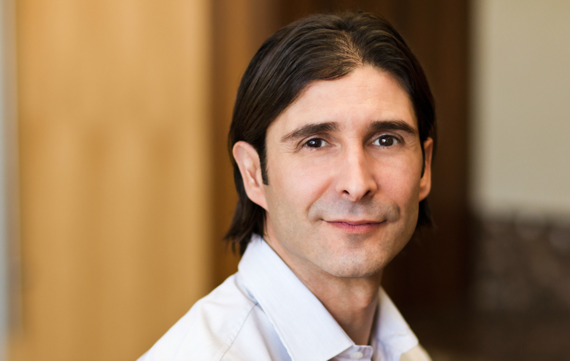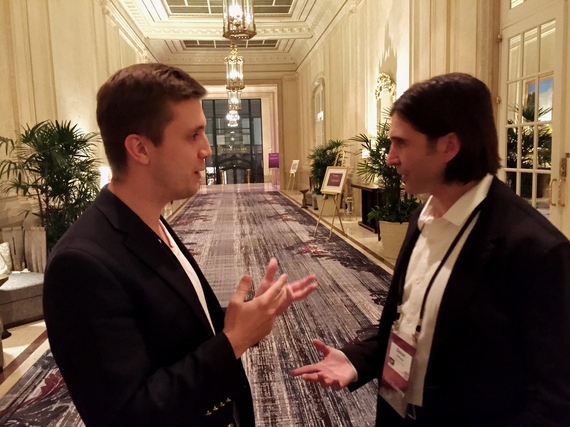At O'Reilly's Next:Economy conference in San Francisco, the venture capitalist talks about his formative experience, his investment philosophy and how to stay focused when things are not going well.
Simon Rothman invests in entrepreneurs building consumer networks and platforms, and leads Greylock's $100 million commitment to marketplace investments. He worked for several years at McKinsey & Company before joining eBay, which he helped to scale to nearly 200 million users generating over $40 billion in merchandise sales. He has also served as an early Tesla Motors board member.
What was your formative experience when you grow up that shaped your life?
I was born overseas, and being raised here as an immigrant is pretty formative. You're willing to take risks and it drives you. You feel pressure because a lot of people made sacrifices for you to be here. Those sacrifices weigh on you in a way that make you feel ambitious. And I grew up in the Midwest and now when I look at companies my mental framework is the Midwest and it real products for real people is important. My reference point is always will it work for my family or my childhood best friend?
Do you have daily habits that make you more effective?
I work out daily to relieve stress and it helps me to get through the day, but not really. I feel I am on that treadmill, and I barely keep up. I don't feel like I'm fully in control. I have more things that I have time to do.
What is one of your favorite books?
I don't have a particular book, but there are a lot of topics. For example, I was interested in game theory for a while. Much of the things we do in technology remains to be written. It is helpful to know business history to understand why things are the way they are, as opposed to teach you what you should do.
What does your investment philosophy entail?
I believe in distributed networks. If you look back at the industrial revolution, it was about centralizing tools of production, centralizing assets and people, and right now we are unbundling the industrial revolution. We are going from centralized assets and people to decentralized and that transition is moving us from companies to people. We will see these distributed networks and marketplaces that will eat a lot of industries and in the process redefine workers, work and companies. It is a thesis that is going to last a generation.
What advice would you give to your younger self?
Take more risk. The more risk I take, the more I realize the more risk I should take. There is almost no threshold of risk mitigation if you live in this world. You have to take as much risk as you can bear and then maybe a little bit more.
What are some misconceptions about startups that you learned about?
Everyone here is smart. It is easy to over optimize everything. At the end of the day very few things matter. Having a product or service that the customers love and hiring the best people you can is all that matters, even if that means hiring slowly. To the extent that you know the people that you hire are better than you are.
How do you stay focused when things are not going well?
You have to figure out what your job is, what the customer wants. Focus is about remembering what matters. The real trick is how do you not forget that. It is really hard to find the one metric that matters most and that you end up optimizing for. It is starting out by knowing what it is. My brain seeks for simplicity. For me, I strive to find the thing that matters the most and it is my orientation. Good entrepreneurs strive for that. If you don't know what your one metric is, you should figure that out right away and then you should find your own process to do that.
How do you discriminate ideas and decide which one to pursue?
Everyone has their own process. I tend to ask friends what is the one thing that matters most to you. For example, if you are looking for a job is it team quality or passion for the idea or something else? I want to pursue something where there is a benefit beyond economics that I feel good about myself. I tend to focus my attention on things that have this kind of impact. I moved away from passion projects, and focus on projects that have an impact.
What is the best thing you learned from Elon Musk?
Elon is exceptional in many different ways. His trait of risk-seeking is unusual and really powerful. Elon has no fear and is very confident and talented and when you combine that with not being fearful it makes you dare to do big great things. A lot of people are smart and talented, but not many have this fearlessness. It is an unusual trait and makes him unusually successful. He is very rational and very quick in making big decisions. All good leaders have to do that.
How did you find your purpose that was unique to yourself?
Everyone likes something and we live in a world where people could be exposed to everything, they would find what they really love. I think everyone has that in them to really love something. Many people seek it out, some don't, and I have been lucky and I have been exposed to a bunch of stuff. I'm the kind of person when I like something, I love it and it is not ambiguous. Ever since I was a kid when I really liked something, I knew it. Then I became obsessed with it. Giving yourself the right to pursue that is a luxury and hard, but you can find that in hobbies and work. Look for that.
How do you curate your relationships?
That's organic. They feel right or they don't. People gravitate toward each other, or they don't. You either feel that you have a common connection, or you don't.


